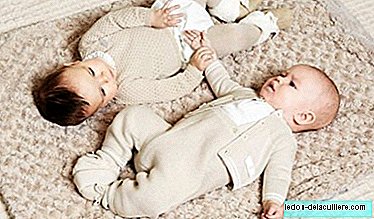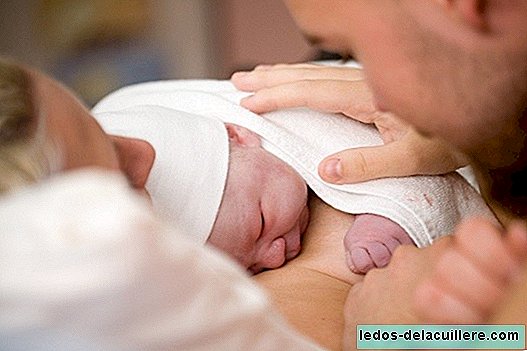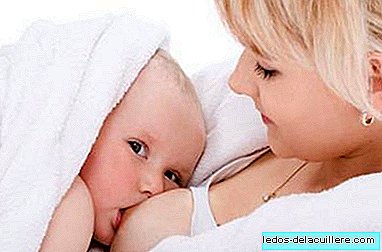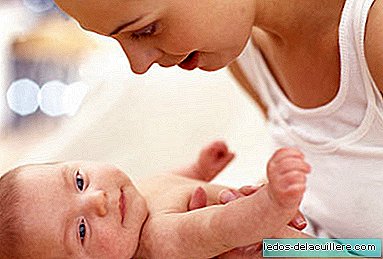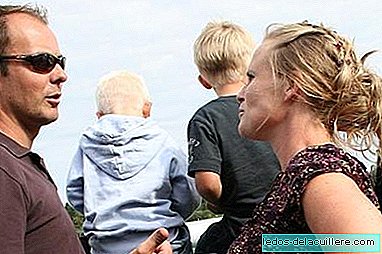
Given the proximity of Valentine's Day, a date on which we celebrate love, we wanted to talk to the psychologist Isabel García about love and the new family when the children arrive.
When we become parents, it is normal for changes in the relationship. About this, as well as about the sex in the couple, the jealousy towards the children and the couple model that we transmit to the children we have talked with Isabel Garcia.
When the children arrive, it is very frequent to prioritize them and for the couple to go to the background. What advice would you give parents to take care of the relationship?
Maintaining couple moments, as they had before, is important. Find a time to devote to each other, although it is a little while a day, without hurry or obligations, it is good to maintain the communication link, of contact. In addition, looking for complicities, winks that can also be used in front of children strengthens the bonds of the couple. It also helps to find a weekly gap at least to do something together, as was done before, things we like to share with each other, everything is worth, what each couple likes: theater, concerts, cinema, massages, go to dinner, tapas, a mini-trip ... And something fundamental is the sense of humor. Take situations with humor, be clear that for a while the little ones will require a lot of attention and time, and that the relationship with our partner has to be coupled in another way, it is not bad, it is another way to evolve, with new elements of coexistence that can enrich the relationship very much. Too have a space for self help, that once every x time (that each couple requires) the other member of the couple takes care of the children so that each one can do something on their own (go to a museum, take a bath without worrying about anything, go for a walk, read, or go for drinks with friends ...) This is important so you can also "miss yourself" and continue "being yourself".
Another major concern of parents with children is the intimacy of the couple. Sex also changes, not always for good. How to keep passion alive?
Speaking, telling us what happens to each one, and with tons of respect, support and understanding. If still, there is something that has "hurt" us because sex is no longer as before, perhaps it is convenient to go to a professional in case there are previous situations that are preventing us from loving as we would really like our partner. There are insecurities that take strength in these situations, and it is important to work them so that they do not undermine our relationship or our sexuality. In a relationship everything is evolving, you can continue to have magnificent sex although we may not be able to have it so often for obvious reasons of lack of time, tiredness, a child sleeping in between ... etc. To continue being affectionate, to have details, to take our moments to look us in the eye, or to fix ourselves, or to like us, usually has good results.
Are there jealousy from parents to children? How to reconcile both affections?
From my point of view it is logical that there are frictions of emotional relocation when a new member enters the family. Keep in mind that previously established roles give way to other different roles and variations or readjustments in the previous ones. It is not necessary to reconcile both affections if both affections sit and express themselves. The problem comes when one of the partners feels that "they no longer receive the same" or that "only the baby receives." Any feeling of this kind must be able to be expressed, collected and solved. For this it is necessary to have a good communication of couple, and have the will that all family members feel taken care of. To do this, all members have to "give" and everyone has to "receive." In any healthy affective relationship, usually, the more you give love, the more it comes back to you. If there is any "knot" in the middle of all this, it would be convenient to review where it comes from, and, if necessary, to treat it.
All members have to "give" and everyone has to "receive." In any healthy affective relationship, usually, the more you give love, the more it comes back to you.
Children assimilate what they see at home as normal. Do you think the children repeat the couple model they see in their parents? How can we convey a healthy couple model?
The children, in fact, create an attachment filter based on what they live in its first years of life (and the following, of course). Once that filter is created, humans usually go "replicating it" in our future emotional bonds, so it is very important to know how to establish with our children a secure attachment. This is the strongest basis for future emotional stability. On the other hand, children absorb absolutely everything from the emotional environment in which they are raised, so we cannot convey a model of a healthy couple unless we are really a "healthy" couple. To do this, if there is any emotional nuclear problem in any of the members, work must be done. And if there are relationship problems, they have to work too. In any case, it is essential that we do not hold the children responsible or witness the problems we may have as a couple. They are children, and we are adults. They have to dedicate themselves to play, to know themselves and the world, to acquire security, confidence and strength to develop in all their fullness and potentiality, and we are responsible for provide them with an emotional environment conducive to itSo, if there is something we cannot control or that prevents us from giving them this, we must see what it is and give it a solution as soon as possible.
How and from what age do you think there is to talk with the children about couple love?
When they demand it. If we have been able to create strong and healthy communication channels with our children, they will come to us to ask us the things they need. This also includes that we know our children, and that if, although one of them is not asking directly, but we perceive that he is interested in the subject, we will consider if he needs more information or at least transmit that we will be there to give it to him or refer him to a Secure source of information if required later.
Finally, what similarities are there between the love of the couple and the love towards the children? Are there different types of love?
Of course. There are as many types of love as there are different people in the world. But the basic ingredients that should not be missing in any of these loves are Respect, love and mutual support.
We thank Isabel García for giving us this interview for Babies and more. I am sure it will help many parents who may feel identified with some of the situations we have addressed.


